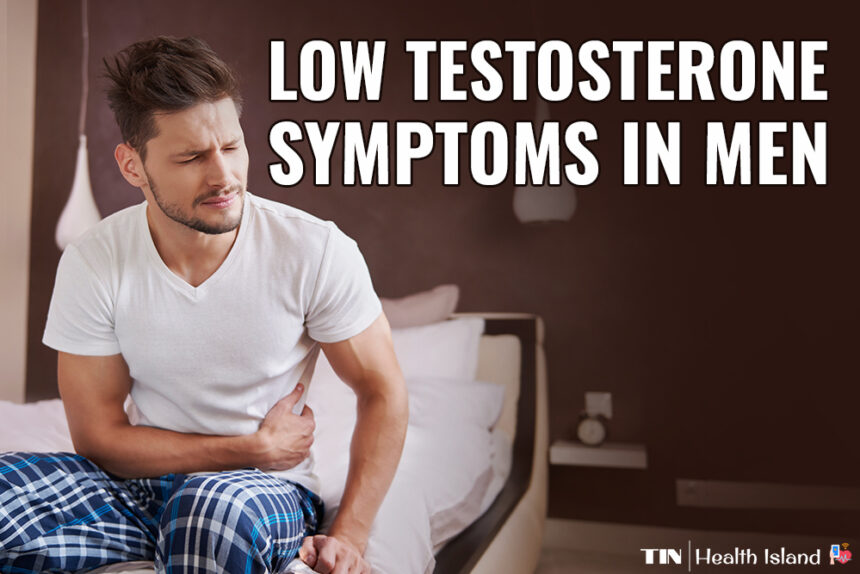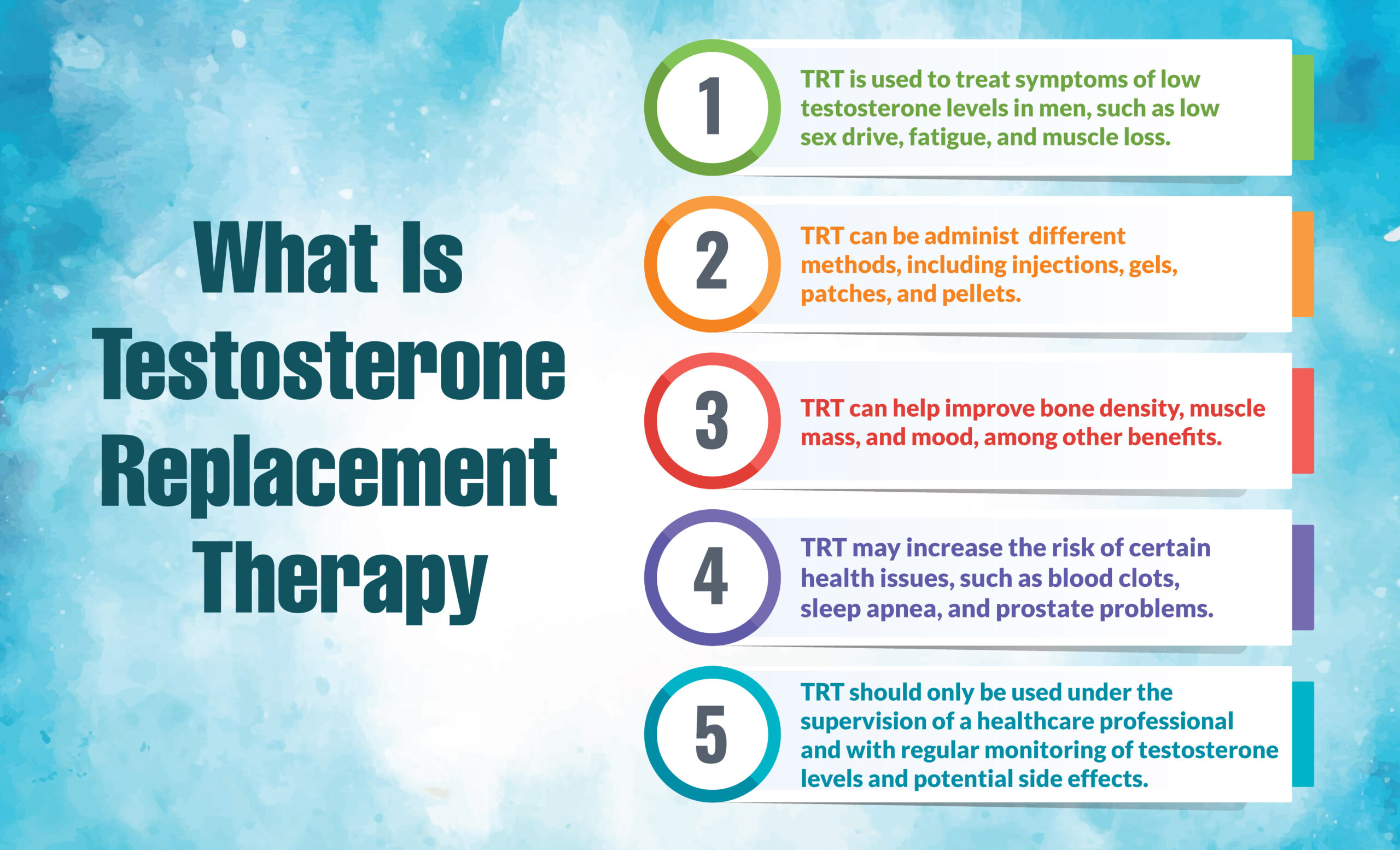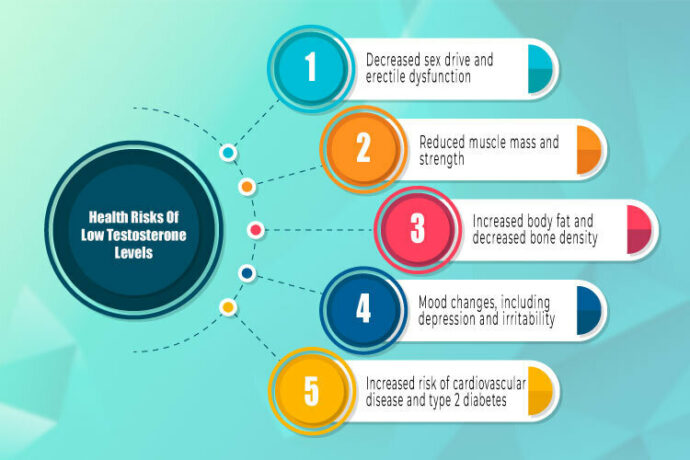Testosterone is responsible for most of a man’s sexual development and function. The hormone is present in both genders, but the concentration ratio differs. Its production peaks around puberty and decreases once a man is 30 causing low testosterone symptoms in men.
The decrease is usually at a rate of 1% each year, which is normal and doesn’t pose any complications.
This article looks at the importance of testosterone, the effects of low testosterone in men, and what causes the dip. In addition, it discusses solutions such as testosterone replacement therapy.
Signs and Symptoms of Low Testosterone
A gradual reduction of the male sex hormone will reveal most symptoms on our list. However, an unhealthy depletion and your body not producing enough testosterone will exaggerate these symptoms.
Testosterone depletion is natural, and people use testosterone boosters to enhance their testosterone levels naturally. However, understanding these symptoms can help you make a better choice for treatment.
Let us look at the signs and symptoms of low testosterone in detail.
The male sex hormone, testosterone, is in charge of libido. It’s possible to experience a decline in your sex drive with a dip in your testosterone level. However, this is not common in healthy males. So, you should be concerned about having a significantly low sexual drive.
Low testosterone levels result in muscle wasting, which is when your muscles lose bulk and strength. You may not visibly see these signs and symptoms, but you will feel a difference in how your muscles work.
For example, you’ll find weights you used to lift suddenly seem too heavy. Additionally, you’ll stop moving as fast as before. Since free testosterone helps your muscle cells retain their fibers’ strength, low testosterone results in such wasting.
Low testosterone level is common in men with increased body fat. Low testosterone accelerates the process, and you will likely gain weight as you age and move less. Studies show that obese individuals tend to have lower-than-normal testosterone hormone levels. Significant weight gain affects your overall health as well as lowers testosterone levels.
Testosterone deficiency leads to difficulty in achieving and maintaining an erection. This sex hormone tells the brain to produce nitric oxide, a chemical that begins the process of achieving an erection.
Low testosterone levels inhibit such communication with the brain, making it hard to get an erection and resulting in low libido. Additionally, erectile dysfunction makes it hard to have spontaneous sex.
Low testosterone affects your hairline since it is involved in hair production. While balding is a natural part of aging, those with low testosterone levels will experience it much earlier. Therefore, some will lose facial hair, with others losing body hair.
While most physical testosterone deficiency symptoms are evident, mental changes may not be so apparent. Low testosterone levels combined with high cortisol levels lead to feelings of anger, hostility, anxiety, and overall irritability. On the other hand, you may also experience depression, which further worsens your mood.
These hot flashes will be similar to what women experience. Therefore, you’ll notice a warm sensation that comes on suddenly, reddening of the skin, and heavy sweating.
These symptoms will last a few minutes, followed by a cold sweat. What’s frustrating about this symptom of low testosterone level is its irregularity. Some people experience it several times daily, while others feel it more frequently. There are also reports of individuals experiencing them up to ten times daily.
Low testosterone levels can lead to memory issues, often called brain fog. People often experience difficulty concentrating, thinking clearly, and remembering things with memory impairment.
You’ll find it hard to pick the right words, bump into objects more than usual, and have depth perception challenges. You’ll also find it hard to organize and stick to a schedule. Furthermore, you may become easily irritable when you realize these simple things have become problematic.
Low testosterone levels put you at risk of anemia. You may notice difficulty concentrating, leg cramps, a rapid heart rate, difficulty sleeping, or dizziness. While these may indicate something else, that combination also shows a low blood count.
Low testosterone usually causes a decline in energy levels. Therefore, if you’re constantly tired despite getting plenty of rest, check to see if your testosterone levels are normal. The same applies if you find it mentally taxing getting to exercise.
Testosterone is vital in the growth and maintenance of penis and testicle size. Low testosterone leads to a disproportionately smaller penis and testicle and a softer-than-usual scrotum.
Osteoporosis, the thinning of bones, is usually common among women. Testosterone is a vital component in bone tissue development and bone volume maintenance. Therefore, a significant loss of testosterone in men will also lead to decreased bone mass.
What Is Low Testosterone?
Low testosterone, also known as male hypogonadism, is a condition characterized by insufficient production of the male sex hormone in the testicles and from low blood testosterone. The Leydig cells in the testicles are responsible for testosterone production.
The symptoms of low testosterone can vary depending on age, with testosterone levels naturally declining in adult assigned-male-at-birth individuals as they age. This includes cisgender men, non-binary individuals assigned male at birth, and transgender women not undergoing feminizing hormone therapy.
Low testosterone may also refer to testosterone deficiency syndrome, testosterone deficiency, primary hypogonadism, secondary hypogonadism, hypergonadotropic hypogonadism, or hypergonadotropic hypogonadism.
Causes Of Low Testosterone Symptoms In Men
While you can expect decreasing testosterone levels as you age, a faster-than-usual decrease should be alarming. Testosterone boosters are used for muscle gain and to combat these very causes of low testosterone.
Testosterone levels fall because of these conditions:
There is a link between low testosterone and diabetes, where diabetes is likely to affect testosterone production. Similarly, low testosterone makes you susceptible to diabetes later on. This condition occurs due to insulin resistance prevalent in men with low testosterone.
Insulin resistance forces your body to produce more insulin to keep blood sugar at normal levels. Random tests on diabetic men indicate they have low testosterone. Therefore, low testosterone and diabetes will continue to facilitate each other. Research is ongoing to establish which one causes the other, but as of now, this remains a worrying trend.
Testicular trauma, injuries, and such incidents can lead to low testosterone levels and thus lead to male hypogonadism. Men have two testicles that produce sperm and testosterone. The thick, tough skin layer of the scrotal sac protects these.
Excessive rubbing, blunt force, sharp force, or an infection can lead to the testicle unit getting damaged. Alternatively, the injury or infection can block the blood supply to the organs, leading to their malfunction. No matter the cause, an interruption of normal testicular function will reduce or stop testosterone production.
Cancer diminishes life’s quality. Think of what prostate cancer and blood clots does to a man and his perception of identity and worth. Unfortunately, it doesn’t stop there. Research shows that cancer treatment through radiation and chemotherapy causes a significant decline in testosterone levels.
Prostate cancer and other cancer survivors may feel fatigued, lose interest in sex, or not perform as before. The situation is worse, especially for prostate cancer patients, as radiation focuses on their testosterone production region.
Obesity and low testosterone are also a combination of conditions that feed off each other. This condition leads to low testosterone levels when fat cells metabolize testosterone to estrogen, thus lowering the levels. Similarly, low testosterone creates a conducive environment for weight gain.
A tumor near the pituitary gland in the brain can cause diminished production of testosterone and other hormones. Additionally, a tumor pressing on the pituitary gland may cause excess hormone production, indirectly leading to lowered testosterone production.
Obstructive Sleep Apnea is a sleep disorder in which your breathing is repeatedly interrupted. As a result, your sleep pattern will include short naps pieced together instead of one long stint. While you may appear asleep, your body will constantly wake up and fall asleep, which is not good. During sleep, your body replenishes its hormone levels, including testosterone. Interruptions hinder adequate replenishment, leading to low testosterone levels.
Advanced liver disease causes testosterone levels in men to drop significantly. As the disease progresses, so does the drop in testosterone levels. Liver cirrhosis patients could lose more than 90% of their testosterone. Low testosterone levels further advance liver disease since the body is weaker than before.
Using steroids can inhibit the normal hormone production processes in the body, resulting in low testosterone levels. Other side effects of steroid use include low sperm production, decreased testes function, and shrinking of the testes. Such adverse effects on testosterone production centers further lower testosterone levels.
How Is Testosterone Deficiency Diagnosed?
There are a lot of ways by which low levels of testosterone can be diagnosed. You’ll need a blood test to diagnose low testosterone. For the best results, you should take the test in the morning when your testosterone levels are highest. A confirmatory test may be necessary for accuracy.
A blood test known as a serum testosterone test can also determine your testosterone levels. Other possible testosterone levels test are follicle stimulating hormone, estradiol hormone test and glycosylated hemoglobin blood test.
It is normal for the doctor to ask you to stop taking certain medications and other substances that could influence your normal testosterone levels. These include steroids, anticonvulsants, barbiturates, opiates, and androgen or estrogen therapies.
There are also blood tests for luteinizing hormone, which bring out the real sperm production numbers. There are blood prolactin level and blood hemoglobin which are also checked.
Besides the blood test, your doctor may need to perform a physical examination, depending on your symptoms. These include abnormal weight gain, height loss, facial hair loss, and an unusual increase in breast tissue size. If low testosterone diagnosed, you can move forward with the necessary treatments.
Preparing for results indicating high testosterone levels is important and is no better. Understandably, most men are concerned about low testosterone levels, forgetting they may have the opposite condition. Therefore, brace yourself for that eventuality as well.
Treatment For Low Testosterone
Various treatments are available for low testosterone, but we have researched the most effective and relatively easy ones, which you can look into and choose for yourself.
The treatments are listed below:
Testosterone replacement therapy is an efficient way to correct a low testosterone situation in men.
This therapy has successfully reversed some of the symptoms of low T. People who underwent this treatment have muscle strength and bone density, improved libido, diminished cases of erectile dysfunction, and better mood. Remember that different individuals exhibit varying degrees of success with testosterone replacement therapy.
Therefore, your doctor should thoroughly review your case before prescribing any testosterone replacement therapy option. Below are some of the options for testosterone replacement therapy.
You can inject isolated testosterone, or a doctor can do it using a syringe. This testosterone replacement therapy solution is the least expensive but the most painful. You’ll need to get several injections weekly, where you’ll notice crests and troughs in your testosterone levels.
It’s also important to note that you’ll need consistency for this type of therapy. Typically, you can expect to regain your libido within six weeks of injections. Such progress should not make you think you are in the clear. Other parts of your body and mind need this testosterone therapy. Therefore, follow your doctor’s advice and remain patient and disciplined.
This form of testosterone replacement therapy is one of the most convenient. There is no pain from using the gels and patches. You only need to place the patch on your skin or apply the gel. The supplemental testosterone will then seep through your skin, thus the simplicity and convenience of this solution. In addition, this solution helps you keep a steady testosterone level.
However, you may experience itching and skin irritation at the contact point. Additionally, this solution can cause others who come into contact with you to suffer the side effects. It is why children and women should never touch their skin using a gel or patch.
Kids may experience early-onset puberty. Similarly, women may suffer acne or unusual hair growth. Therefore, you must be mindful of their presence and practice some restraint to keep them safe.
Tablets are one of the best forms of testosterone supplementation. Place these tablets between your gums and cheeks in your mouth. Over time, the pills will dissolve, thus releasing testosterone into your body. This testosterone replacement therapy option is simple to use. However, you may experience sensitive gums, a bitter taste, and headaches.
The good news is those effects tend to subside as the therapy progresses. In addition, you won’t have to worry about coming into contact with women and kids. You can perform your normal activities without transferring any side effects to them.
Natural Ways To Boost Testosterone Levels
Weight loss and regular exercise have the potential to naturally increase testosterone levels in the body. While lifestyle and dietary changes alone may not be sufficient to significantly raise testosterone levels, they can still be beneficial.
It’s important to note that testosterone levels naturally decrease in males as they age, and the impact of lifestyle changes may diminish over time, with younger individuals often experiencing more pronounced results from exercise.
Dietary factors also play a role, as diets high in saturated fats can negatively affect testosterone levels. At the same time, zinc, omega-3 fatty acids, and antioxidant vitamins can support testosterone production. Adopting a well-balanced diet that includes nutrient-rich whole foods and limits saturated fats can potentially help boost testosterone levels.
Conclusion: How Do You Fix Low Testosterone?
Low testosterone levels in men worry more when the decrease is unnatural. Men usually produce testosterone steadily once they hit puberty.
Production starts to decline when they reach 30, at a rate of 1-2% annually. Any decline higher than this necessitates investigating the cause and applying the correct remedy.
Testosterone replacement therapy is the best solution if done right. There are risks associated with the therapy, depending on what caused the decline, individual body conditions, and hormone reactions.
Testosterone boosters are a viable solution for erectile dysfunction and other such conditions. We discussed other testosterone treatment options to provide you with as much information as possible to make informed decisions.
We covered everything we could to help you understand low testosterone and everything related to it. Hope our article has helped you gauge the topic of testosterone a little better.





